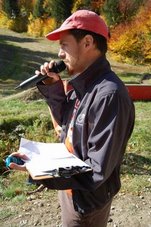As usual, the Dartmouth weekend was a stunning success. As I had to explain to several administrators & officials in the weeks leading up to the race, the Dartmouth promoters operate in a kind of stealth mode. You get real worried because the permits & flyer all show up at the last minute, but when you hit the ground on race-day everything's excellently prepared.
We haven't used that road course in a couple years, but it used to be a staple of the ECCC calendar. The finishing climb and opening segments were excellent new additions though, improving the logistics and raising the bar for the racers. Previously we staged in the edges of Hanover and finished in Norwich, the small town the course goes through. Thetford Academy was a much better staging area though, and the finishing climb a great addition. The crit has also been used a number of times over the years, frequently in the rain.
Rolling around behind some of the fields this weekend, I thought a lot about some of the great races I've seen and even been in there. The combination of stiff climbing and long flat section make the road race very tactical, and the crit's a surprisingly technical affair. Some of the most epic Drexel Cycling weekends have been up at Dartmouth.
At one point years ago all of the Drexel mountain bikers---15 or so racers---bought road bikes and started racing both seasons, instantly lifting the road team from a paltry 2 members to a regular group of ~13 racers. It was a big change. We had racers, we had new kits, we had no budget... Certainly not enough to support a good baker's dozen of riders doing all of both the ECCC MTB and road seasons.
Absurdly cheap, starving college students that everybody was, we decided to camp. All year. That works ok for MTB season. Road racing is brutal for camping. It's hard to find sites and the weather can be disastrous, as it chose to be that year. Needless to say, we got into a pattern of basically driving to a race and finding somewhere, anywhere, near the courses to camp, then praying fervently that no one caught serious hypothermia. Fortunately, a few weeks into the season EMS had a large sale so a lot of us stocked up on real winter sleeping bags rather than the layers of blankets and summer, boy scout-type bags we had been using. Only one serious hypothermia problem developed that season.
Rolling up to Dartmouth, we had no idea where we were going to camp. Fortunately, it turns out there's a golf course right on campus so we rolled up, threw down our bags, and slept under the open skies on one of the back holes. Let me tell you, no camp site is more plush than the greens on even modestly kept golf courses. I'm sure we would have been arrested if the police weren't so busy controlling the raging keg party going on a couple holes down.
Waking in the morning was breathtaking with the sunrise coming up over the trees before us, shining in the cool air, its brightness only amplified by the excitement of misdemeanor trespassing. That, however, was not nearly as exciting as driving around town looking for breakfast and sighting one of the Dartmouth racers, super popular that year for her habit of walking around all day in blazingly loud ski racing tights matched up with even louder cowboy boots & hat...
A few years later, we still had a solid ~13 road racers, though we'd graduated to staying in ultra skeazy hotels. That year's Dartmouth trip featured lodging in the Days Inn down the highway, its main feature being the FunDome---a large interior, indoor courtyard packed with dead fake plants, greasy barbecue grills, greasier jacuzzis, lots of broken arcade machines, and even more underage prom night partiers...
Just like this year, the crit was a sloppy, awful mess for good portions of the day. I freely admit swinging way too wide and off into the grass not once but twice on the hairpin downhill-uphill corner by the pond, mud flinging everywhere as I spun wheels trying to get off the grass and sprint back into the field. The second time it didn't happen; my only solace was that Erik, the only other Drexel rider in my races that year, also popped at one point and we finished the crit hand in hand, completely unable to see through all the rain and grit.
The road race was really where the action was though. Erik and I were doing well that year, and really looking for a solid result. Early in our race a few marked riders made a break for it on the first set of rises. Knowing that was the gambit, I booked it through the next two climbs to tack on just before they hit the descent. The break worked pretty well for some time, gaining lots of ground over the next lap or so, but I couldn't hold it and eventually fell off just after the hairpin, legs burning, dieing.
Trudging down the flat stretch, blasted by headwind, I was utterly shattered, completely cracked. When the group came by, I was a goner drifting alongside, no hope of latching on. Then I saw Erik, looked in his eyes, and thought "Save me." He started yelling to get in, made space in the line, gave me some of his bars to replace my devoured supply. The next time through the climbs, drained, I couldn't keep up with the group. Erik and I drifted back with the stragglers over the climb until he looked around, looked at me, and said "Follow me." Drawing on all his better technical skills, me following his lead, we screamed wheel to wheel down the descent, passed recklessly, perilously through the hairpin, flew full speed through the short rise afterward and reattached to the field momentarily.
Regrouping, re-energized, we both pulled through to the front of the group and drilled it together for the remainder of the race, fighting a mammoth, fruitless battle to push the pace through UVM's smothering block and reel in the break. Unsuccessful, it was a still an epic, fantastic race for us, both smiling as we rolled through the line behind the lead cluster putting it out for the field sprint. Like many great races it perfectly encapsulated the true beauty of competitive cycling, seamlessly blending individual effort and team strength.
Postscript: In keeping with the true team spirit among the Drexel crew, Erik sprinted right past me as we coasted across the line, ensuring he got placed just ahead of me. Looking back, all smiling teeth with a big cheesy grin, he almost crashed out of shock when I instantly, intensely let out a string of curses upon his name and honor the likes of which any pirate would be proud. It was so bad, a moment later we turned around and apologized to the officials to ensure I didn't get relegated. They professed not to hear anything, but John Frey, whom we didn't really know at the time, said "Oh man, that was you? I heard that! Sniped you at the line, didn't he? Ha!"





